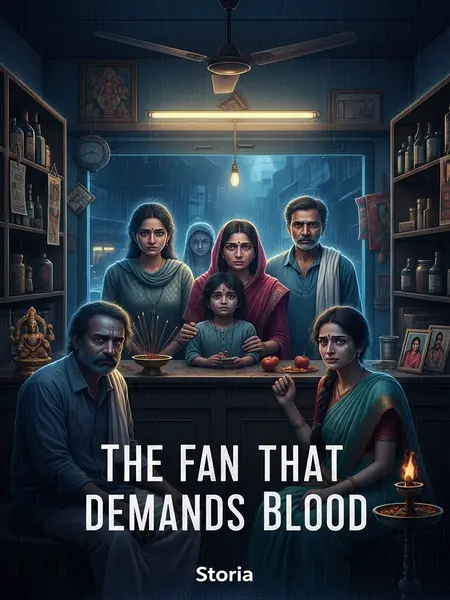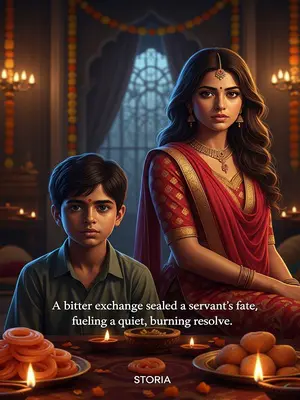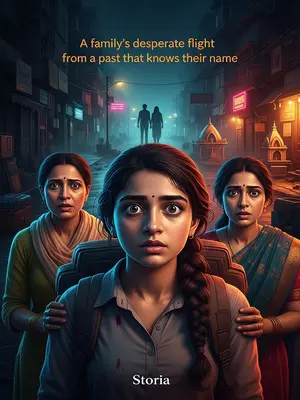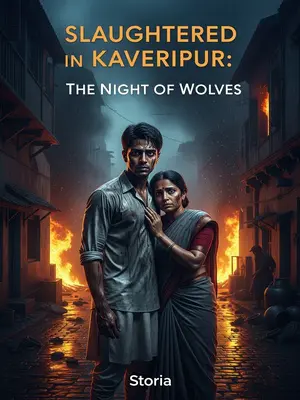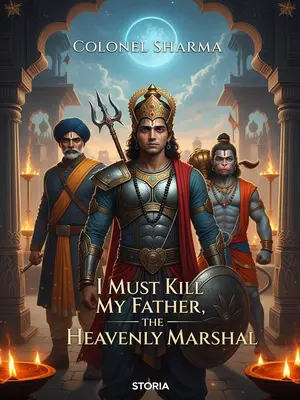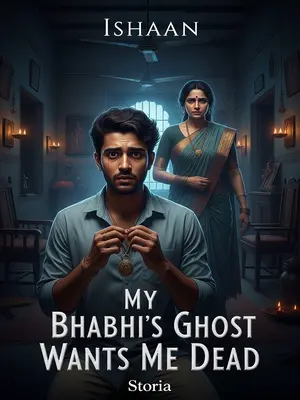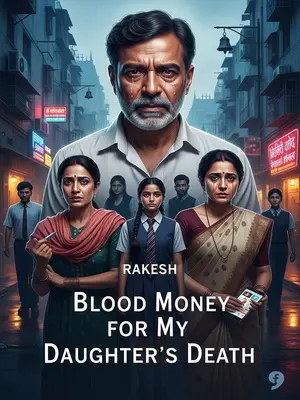Chapter 3: The Spirit’s Return
The man's face turned grim. He rubbed his neck and muttered, 'Gardan mein dard kyu ho raha hai achanak?'
He pressed his fingers into his skin, as if searching for a lost memory. His eyes flickered, distant and clouded.
Just then, my grandfather entered, carrying food. He looked up at the fan, his face clouding with concern. 'Beta, fan ke neeche mat baitho. Mazboot nahi hai. Idhar aa kar baith jao.'
Grandfather’s voice was sharp, full of authority. He shot me a look—one eyebrow arched, checking if I was alright.
He placed the food by the window and switched off the fan. The sudden silence was deafening. Even the rain seemed to pause, waiting.
The man stared at the still blades, blinking rapidly, as if waking from a bad dream.
He shuffled over and sat by the window, hands clenched in his lap. The rain pattered against the glass, blurring his reflection.
Grandfather arranged the food with care, placing a spoon and a wedge of lime beside the bowl, just as he did for regulars. 'Socha noodles thanda na ho jaaye, pehle ek bowl bana diya. Biwi aaye toh doosra bana dunga.'
The man nodded, but his voice wavered. 'Uncle, fan mazboot nahi hai? Kya pata kuch ho jaaye...'
His eyes darted between the fan and the dark corners of the room.
Grandfather shrugged. 'Yahan sardi zyada rehti hai. Saal bhar fan chalate nahi, isliye naya nahi lagaya.'
But I could see the unease in his eyes as he wiped his hands on his dhoti, avoiding the man’s gaze.
The man peered at the fan, then the black bag hanging next to it. 'Uncle, uss kaale bag mein kya hai? Do saal pehle bhi dekha tha.'
His eyes lingered on the bag, swinging slightly in the draft. The question hung in the air, heavy as a monsoon cloud.
Another thunderclap boomed, shaking the windows. A small piece of plaster fell from the ceiling, landing with a soft thud. I flinched, half-expecting more to fall.
White dust drifted down, settling on the old radio like the ghost of an old story trying to return.
Whenever it thundered, I didn’t dare look under the fan. I kept my eyes glued to the floor, counting tile cracks, praying for the storm to end.
Grandfather forced a laugh. 'Kuch nahi, bekaar ki jari-bootiyan. Lene ka man nahi karta, wahin latka diya.'
But I knew he was lying. Once, late at night, I’d seen him tuck something into that bag, whispering a prayer. It was the only time I’d seen him truly afraid.
Neighbourhood gossip said the black bag held a treasure. Some claimed it was an old coin from British times; others whispered it was a charm from a Banaras baba, meant to keep evil away.
Our desi daru was so fragrant that whenever it was made, Grandfather would take down the black bag. After the daru was finished, he’d hang it up again. No one really knew what was inside.
Sometimes, the aroma would drift through the mohalla, drawing in customers and curious onlookers. But whenever Grandfather touched the black bag, even the street dogs avoided the shop.
As Grandfather finished speaking, we heard movement at the door. The bells jingled, startling us. Even the rain seemed to hush, waiting for what would happen next.
A woman carrying a little girl entered. The woman wore a faded blue saree, her eyes red-rimmed, steps slow and deliberate. The little girl clung tightly, cheeks flushed from the cold.
She was pale, eyes bloodshot. Though the rain outside was heavy, she wasn’t wet—only her shoes and the hem of her saree were damp, as if she’d walked through another world. Her bangles clinked softly, a mournful sound.
The little girl, in a bright red frock and two neat braids, pointed with her tiny finger, her voice sing-song: 'Woh dekho, didi wahan hai!'
Her high, sweet voice made my blood run cold. Grandmother gasped, pressing her lips together the way women do when they don’t want to cry in front of children.
Then the girl giggled—'Hehehe.'—the sound echoing through the shop, lingering like a chill you can’t shake. She looked adorable, but something in her dark eyes—almost no whites showing—made me shiver.
I glanced at my cousin, but he stared at his shoes, pretending not to notice. Grandfather’s face turned ashen.
The woman stroked the little girl’s head and smiled—her lips pressed tight, eyes darting to the puja shelf, as if looking for protection. 'Gudiya ko didi dikh rahi hai. Didi kya kar rahi hai?'
The girl’s smile widened. 'Didi uncle ke saath khel rahi hai. Uncle hamesha sir jhukake baithta hai.'
A fresh wave of fear washed over me. I glanced at the man, but he was staring at the red cloth, jaw clenched.
Suddenly, lightning struck a neem tree outside, splitting it in two. The flash lit up the street; for a second, I saw our neighbours pressed to their windows, watching our shop with fear.
A fire sparked in the tree, but the rain quickly doused it. The smell of burnt wood mixed with wet earth. My cousin muttered a prayer, fingers flying to his chest.
Grandfather’s face darkened. He shuffled to the kitchen, shoulders hunched. 'Main noodles bana ke laata hoon. Sab baith jao.'
The little girl looked at him and giggled again—a harsh, chilling sound. I wished for my mother to hold my hand; even the rain couldn’t drown out that laugh.
The woman sat beside the man, clutching the little girl. She eyed the red cloth. 'Uncle, yeh laal kapda beam pe kyun baandha hai?'
Her voice was steady, but her gaze was fixed on the cloth, as if she knew exactly what it meant. Grandmother turned away, fiddling with her saree’s edge.
Grandfather forced a laugh. 'Ek bhikhari ne diya tha. Bola dukan saaf nahi hai. Kapda baandh do, sab theek ho jayega. Pata nahi, sach tha ya bakwaas.'
He glanced quickly at the woman, then at the black bag. For the first time, I saw doubt flicker in his eyes.
The woman’s face turned grim. She stared at the stairway corner, as if she saw something there, gripping the girl tighter. The shadows seemed to shift, growing deeper at the edge of the light.
She said in a sombre voice, 'Uncle, yeh kapda aatmaon ko bulane ke liye hota hai. Bhikhari ne dhokha diya hai. Abhi utaar do, jaldi.'
Her words hung in the air, heavy and final. The wind picked up again…
Outside, the storm raged, but inside, it felt like something far older than the rain had finally found its way in.
